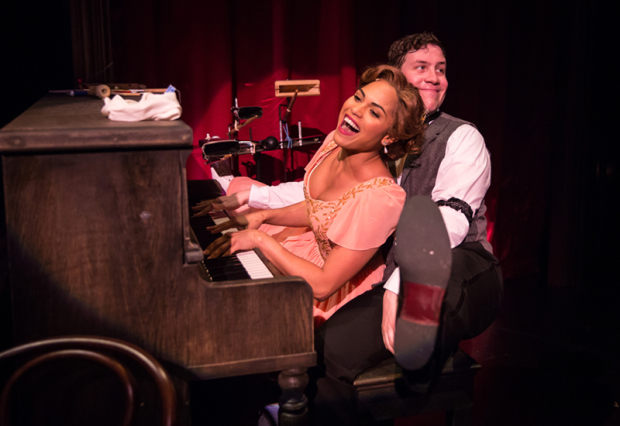Thaddeus and Slocum

(© Liz Lauren)
The Lookingglass Theatre has been transformed into a cozy cabaret space with the audience filling up two-top tables, in addition to the usual seating, for Thaddeus and Slocum. An upright piano sits against the edge of the stage, and a vibrant red curtain is hung overhead. A play about vaudeville seems like a natural choice for Lookingglass, a company known for its daring physical performance and tight ensemble work, but though the idea is solid, the production struggles to find its way.
Thaddeus (Travis Turner) and Slocum (Samuel Taylor) are a pair of would-be vaudevillians, one black and one white, working their act on the street corners of Chicago in 1908. They dream of making it big, but there's no place for a mixed-race act in vaudeville. Rejected, broke, and desperate to get booked at the Majestic, they decide to pose as a pair of white actors who perform in blackface. As their deception strains their personal and professional relationships, they become entangled with the beautiful Isabella (Monica Raymund), a singer with secrets of her own.
Travis Turner stars as Thaddeus, a single-minded and ambitious performer. There's a natural vaudevillian quality to Turner, and it is used to great effect here. Taylor is appropriately shifty and mischievous as Slocum, the lazier, more opportunistic half of the duo. When performing their vaudeville routines, though, Turner and Taylor are marvelously athletic and acrobatic. They defy gravity with their slapstick tumbling, courtesy of circus choreographer Sylvia Hernandez-Distasi and dance choreographer Katie Spelman.
In her Lookingglass debut, Monica Raymund is simply astounding as Isabella. She lights up whatever scene she is in, and her singing voice is marvelous. The highlight of Thaddeus and Slocum is its scenes set in the Eden, a mixed-race club where Thaddeus and Isabella meet with fellow vaudevillians Zeke and Nellie (Tosin Morohunfola and Sharriese Hamilton, both talented hoofers) to trade tips, crack wise, and debate the role of "the colored circuit": Is it a much-needed opportunity for black performers, or is it holding them back from success in larger venues? In the Eden subplot, Thaddeus and Slocum is both funnier and more poignant than anything that is accomplished elsewhere in the show. One wishes for a spinoff play about these four young performers making their way in the world.
Unfortunately, the rest of the play is a hodgepodge, mired down with not-so-sly winks to the audience about the bright future of the Chicago Cubs, and how motion pictures will surely never catch on. Talented Lookingglass ensemble members Fox and Distasi are tasked with serving most of this cheese to the audience, along with Adam Wesley Brown, in a role as a hacky comedian. Molly Brennan shows laudable versatility in the dual roles of Abby, a burlesque chanteuse, and Sarah, Gerry's busybody little daughter.
The set, designed by Collette Pollard, is an effective callback to theaters and clubs of the early twentieth centuryas are the lush costumes by Samantha Jones. New music by Rick Sims is period-appropriate, and sung very well by the cast, but the backing music sounds distinctly canned, detracting from the interactive cabaret atmosphere.
Directed by J. Nicole Brooks and Krissy Vanderwarker, Thaddeus and Slocum careens between broad slapstick, intimate drama, and a thoughtful examination of racial identity in the early 20th century, never staying long enough in any mode to really feel at home. The tone meanders, and stakes are raised and then suddenly lowered with no rhyme or reason. A first-act scene that should be emotionally devastating for Thaddeus devolves into a consciously hammy, vaudevillian play-fight. Later, a personal argument between Slocum and Thaddeus escalates into a realistic brawl. The inconsistency is a head-scratcher. Thaddeus worries, rightfully so, about the consequences of getting caught in their charade, but there is no opportunity for palpable tension to develop. When the real world catches up with our titular vaudevillians, it isn't truly shocking, it's just mildly surprising.











